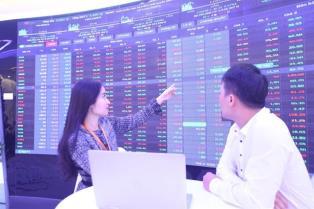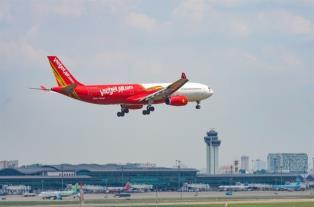The upgrade is expected to take effect on September 21, 2026, subject to an interim assessment in March 2026 to confirm Việt Nam’s progress in improving market access through global brokers.

HÀ NỘI — FTSE Russell has officially announced that Việt Nam will be reclassified from frontier to secondary emerging market status, marking a major milestone for the country’s capital market after more than a decade of reforms.
The announcement was made early on October 8 (Hà Nội time), following the close of US markets on October 7, as part of the index provider’s September 2025 Country Classification Review.
The upgrade is expected to take effect on September 21, 2026, subject to an interim assessment in March 2026 to confirm Việt Nam’s progress in improving market access for foreign investors through global brokers.
According to FTSE Russell, Việt Nam has addressed key technical barriers that previously prevented the upgrade, including settlement cycles and the handling of failed trades. In late 2024, the country introduced a non-pre-funding trading model, allowing foreign institutional investors to purchase shares without fully pre-depositing funds.
A mechanism to resolve settlement failures was also established, bringing Việt Nam’s trading practices closer to international standards.
The index provider noted significant improvements made by Vietnamese regulators, confirming that the country now meets all the secondary emerging market criteria.
However, it also highlighted limited access to global brokers as an area that still needs attention. While not a formal requirement for reclassification, FTSE Russell said enhanced access is crucial for foreign investors to replicate the indices effectively.
The upgrade will be implemented in stages, with FTSE Russell continuing to monitor Việt Nam’s market reforms and gather feedback from international investors before the March 2026 review to ensure the transition remains on schedule.
"The official recognition and upgrade of Việt Nam's securities market is clear evidence of the country's sound development path and its growing capacity to integrate deeply into the global financial system," Việt Nam's Finance Minister Nguyễn Văn Thắng said in a statement.
Việt Nam's benchmark stock index has surged 33 per cent this year, making it the best-performing stock market in Southeast Asia.
The reclassification is expected to attract billions of dollars in foreign capital from both active and passive funds. International brokerages estimate that net foreign inflows could range between US$6 billion and $10 billion in a positive scenario.
Historically, markets often see stronger liquidity in the months leading up to an upgrade, followed by a period of adjustment after the announcement.
The State Securities Commission (SSC) said the upgrade is a key milestone that recognises Việt Nam’s comprehensive reforms to build a transparent, modern and efficient market that is aligned with global standards.
"This achievement reflects the Government’s strong leadership, close coordination among agencies, and valuable support from the World Bank, FTSE Russell experts and global investors," the SSC said in a press release.
Capital magnet
According to securities firms, the market upgrade will lead to its automatic inclusion in key FTSE indices, attracting significant capital from global passive investment funds (ETFs).
Đỗ Minh Trang, director of analysis at ACB Securities (ACBS), said that this upgrade could draw two types of capital. The first is passive capital that will be allocated on the effective date. Global ETFs like the FTSE Emerging Markets ETF and Vanguard FTSE EM ETF are expected to automatically invest in Việt Nam based on its market weight.
ACBS estimates that Việt Nam could attract between US$600 million and $1.5 billion, with Vanguard potentially contributing up to $600 million based on a 0.6 per cent allocation.
If all passive funds are considered, the total could reach $1.5 billion. However, Việt Nam will officially be included in these ETFs starting September 2026.
The stocks that stand to benefit directly include blue-chip companies with large foreign ownership limits and high liquidity, such as Vietcombank (VCB), Vinhomes (VHM), Vinamilk (VNM) and Sacombank (STB).
Trang noted that Việt Nam will capture the attention of numerous active investment funds, which tend to be more stable and long term-oriented, focusing on companies with strong earnings prospects and solid governance.
ACBS also forecasts that active funds could bring in between $3 billion and $7 billion, depending on their investment needs over time. Research from FTSE and the World Bank predicts that active inflows could reach $7 billion, but the absorption period may take three to five years.
While active funds may begin investing soon after Việt Nam’s announcement in March 2026, their actions will depend heavily on the country’s macroeconomic conditions, including GDP growth and currency stability.
HSBC similarly estimates that foreign net buying after the upgrade could range from $3.4 billion to $10.5 billion USD, with ETF investments being disbursed quickly and active funds allocating gradually.
Experts now suggest that the next step for Việt Nam is to aim for MSCI Emerging Market status.
Nguyễn Duy Hưng, chairman of SSI Securities, said the upgrade is just the beginning. The focus now must be on competing effectively within FTSE and progressing to MSCI.
The Vietnamese government has set a goal to achieve MSCI Emerging Market status by 2030, as outlined in recent decrees.
Currently, Việt Nam is not on MSCI's watchlist and has only met about half of the necessary criteria, which are stricter than those of FTSE. If included in the watchlist by June 2026, the earliest feasible upgrade could occur between 2028 and 2030. — BIZHUB/VNS





